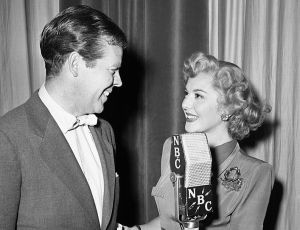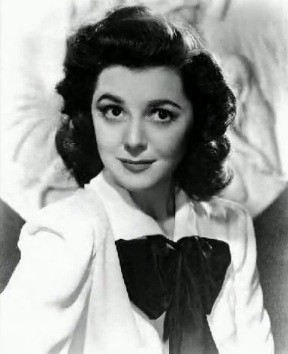Ann Rutherford (1917-2012)
Posted by Ivan G. Shreve, Jr. on Jun 13th 2012
It was her recurring role in M-G-M’s series of Andy Hardy films that firmly cemented Ann Rutherford’s onscreen “girl next door” persona. In many of the movies, typical teenager Andy Hardy (played by Mickey Rooney) would find himself tempted by a young lovely (portrayed by such starlets as Judy Garland, Lana Turner and Esther Williams) only to return chastened to his reliable girlfriend, Polly Benedict (Rutherford). Ann’s popularity in the Hardy series was such that some have speculated that much of that audience attended screenings of Gone With the Wind to see Rutherford emote as Carreen O’Hara, Scarlett’s younger sister. She was indeed fortunate to land the part. Her M-G-M boss, Louis B. Mayer, didn’t want to lend her out…but Ann worked up a few tears (she was a fan of the book) and Mayer relented. Until her passing on Monday night (June 10) at the age of 94, Ann Rutherford was one of the few surviving cast members of the film that many consider to be the greatest of all time.
Rutherford seemed destined for a career in show business. Born in Vancouver, British Columbia in 1917, Ann’s father John was a former tenor for the New York Metropolitan Opera, and her mother Lillian (Mansfield) had been a silent film actress. The Rutherfords moved to California when Ann was nine, and her first foray into the business came when she phonied up an acting resume and submitted it to station KFAC for a job. A month later, she landed a part in a radio dramatic serial broadcast by the station.
The star struck Ann landed her first motion picture role in 1935 in Waterfront Lady, a B-movie cranked out by Mascot Pictures, which would soon morph into Republic. She went on to be cast as the leading lady in that studio’s B-westerns starring John Wayne (The Lawless Nineties, The Lonely Trail) and Gene Autry (Comin’ ‘Round the Mountain, Public Cowboy No. 1). She was hired by M-G-M in 1937 and soon started appearing in the Andy Hardy films (the role of Polly Benedict in the first film, A Family Affair, was played by Margaret Marquis). She was also cast in Of Human Hearts, Dramatic School, A Christmas Carol, Four Girls in White and Pride and Prejudice. She even played leading lady to “M-G-M’s star clown,” Red Skelton, in his trilogy of “Whistling” films from 1941-43; she was Carol Lambert, girlfriend of Wally Benton—the radio actor known to one and all as “The Fox.”

As an M-G-M starlet, Ann made several appearances on the studio’s official radio program, Good News (of 1939)—but her early radio experience also permitted her to take on a regular job as Connie Monahan, the girlfriend of Eddie Bracken on his self-titled situation comedy that was heard from 1945-47. She also replaced the movie Blondie, Penny Singleton, on the radio sitcom of the same name for a brief period beginning in the fall of 1949. Other radio programs that Rutherford guested on include the AFRS series Mail Call and G.I. Journal, and the homefront’s The Radio Reader’s Digest, Cavalcade of America and The Theatre Guild On the Air.
Rutherford left M-G-M in 1943 and decided to freelance, winning roles in productions like The Secret Life of Walter Mitty and The Adventures of Don Juan. But, when the movie roles started to become sparse, she retired from films in 1950 and turned to television, appearing in guest spots on the likes of Tales of Wells Fargo, Perry Mason and The Donna Reed Show. Ann revisited the lot where the Andy Hardy films were shot in 1972 with a small role in M-G-M’s They Only Kill Their Masters…and with the exception of a couple of appearances on The Bob Newhart Show (as Bob Hartley’s mother-in-law) and the all-star 1976 film flop Won Ton Ton, the Dog Who Saved Hollywood, Rutherford decided enough was enough. (She was asked to play the part of Titanic’s elderly Rose but turned it down—giving Gloria Stuart both one heck of a break and an Oscar nomination.)
Ann Rutherford lived out the rest of her life as a wife and mother, but she loved answering her fan mail and attending Gone With the Wind tributes both as a surviving cast member and unofficial spokeswoman for the magical movie factory known as Metro-Goldwyn-Mayer. She had her time in the spotlight and saw no need to prolong it, once saying: “Oh, I suppose, if you were a Helen Hayes, it might mean something if you left the business. You’d be depriving the show world of something. I’m depriving that world of nothing.” She’ll never know how wrong she was.

